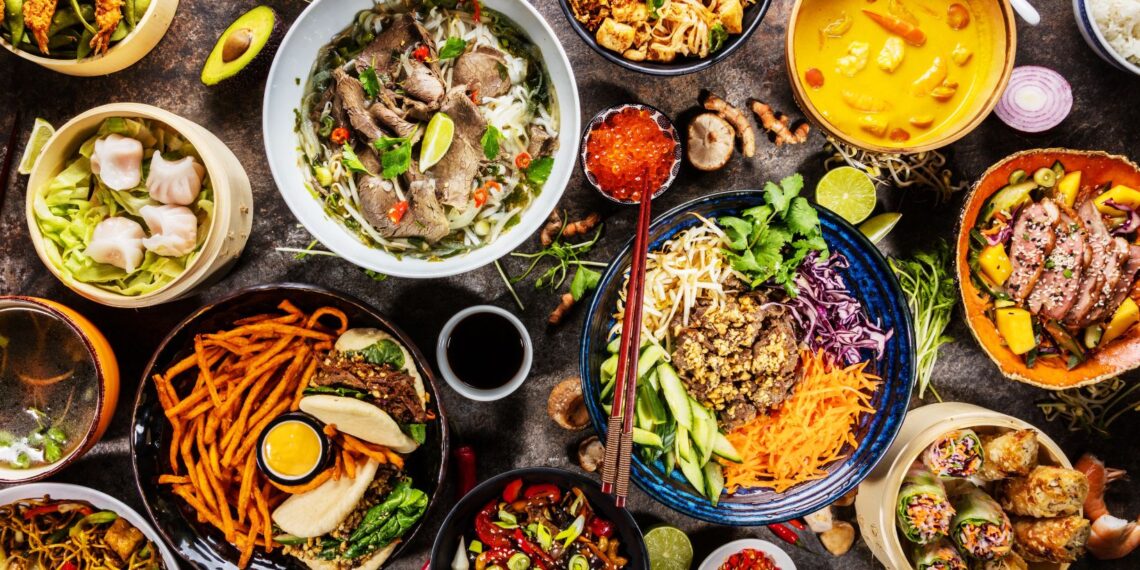Mediterranean cuisine is celebrated worldwide for its diverse flavors that reflect the cultures and traditions of the countries bordering the Mediterranean Sea. This culinary tradition spans parts of Europe, Asia, and Africa, leading to a rich tapestry of tastes and preparation methods. The diet emphasizes fresh vegetables, fruits, nuts, seeds, legumes, olive oil, and lean proteins, particularly fish abundant in the nearby sea.
The distinctiveness of Mediterranean cuisine also lies in its historical roots, where the intermingling of peoples along trade routes brought together a variety of ingredients and cooking styles. These historic interactions have contributed to the repertoire of signature dishes that are flavorful and distinctive to the region. The food preparation techniques, which often involve grilling, baking, or sautéing, allow for the preservation of nutrients, making the Mediterranean diet as healthful as it is palatable.
Key Takeaways
- Mediterranean cuisine is diverse, rich in flavors, and includes many fresh and healthy ingredients.
- It has evolved from a history of cultural interchange, leading to unique and iconic dishes.
- The preparation methods emphasize preserving nutrients, aligning with the diet’s recognized health benefits.
Historical Roots and Cultural Influences
Your understanding of Mediterranean cuisine is enhanced by recognizing its deep historical roots and the cultural influences that shaped it. The diverse flavors and ingredients testify to the region’s intricate past.
Ancient Civilizations and Trade
Centuries ago, ancient civilizations along the Mediterranean basin, particularly in Greece and Egypt, established the foundations for what you know as Mediterranean cuisine. They cultivated crops like grapes and produced wine, staples central to the region’s food identity.
- Greece: Pioneered cultivation of olives and grapes, influencing the widespread use of olive oil and wine.
- Egypt: Utilized the fertile Nile Delta to grow various crops still part of the regional diet.
The extensive trade networks these civilizations developed enabled the exchange of spices and ingredients across the Mediterranean Sea, intertwining the culinary habits of various cultures and countries.
Influence of Empires
The rise and fall of different empires impacted the cuisine significantly.
- Ottoman Empire: Brought ingredients and culinary techniques from Turkey and created a culinary mosaic by incorporating flavors from across its territories, which included parts of the modern-day Middle East like Lebanon and Syria.
- Italian and Spanish Dominance: Italy’s introduction of pasta and Spain’s introduction of staple foods such as tomatoes seasoned the culinary palette of the region.
Imperial conquests allowed for the spread of staple ingredients and dishes. North African influences broadened the spectrum further, introducing new spices and cooking methods. The blend of these diverse cultural elements over centuries has resulted in the rich tapestry of flavors that define Mediterranean cuisine today. All that is now available online as well at Aladdin Mediterranean Cuisine.
Core Ingredients and Flavors
Mediterranean cuisine is characterized by its diverse use of fresh, high-quality ingredients, each contributing to the vibrant flavors that this culinary tradition is renowned for.
The Olive and Olive Oil Legacy
The Mediterranean diet is synonymous with olive oil, which is used generously for cooking and dressings. Olives, both green and black, are staples as snacks, in salads, or as part of savory dishes. Olive oil’s importance is reflected in its variety and usage from simple dressings to complex cooking mediums.
Types of Olive Oil:
- Extra Virgin Olive Oil
- Virgin Olive Oil
- Pure/Olive Oil
Herbs and Spices
Herbs such as basil, parsley, mint, and rosemary add fresh, aromatic layers to the food. Meanwhile, spices like cumin, saffron, coriander, and paprika introduce warmth and depth.
Commonly Used Herbs and Spices:
- Basil
- Parsley
- Mint
- Cumin
- Saffron
- Paprika
Proteins and Legumes
Seafood and meat such as lamb, beef, and pork are central proteins, often grilled or baked to emphasize their natural flavors. Legumes like chickpeas provide plant-based proteins and are used in dips, stews, and salads.
- Key Proteins:
- Seafood (Fish)
- Lamb
- Beef
- Pork
- Legumes:
- Chickpeas
Fruits and Vegetables
Mediterranean dishes incorporate an array of fruits and vegetables, including tomatoes, lemons, eggplant, figs, and dates. The use of lemon juice to add a zesty taste to dishes is particularly common. These ingredients maintain the freshness and lightness of the cuisine.
Essential Fruits and Vegetables:
- Tomatoes
- Lemons
- Eggplant
- Figs
- Dates
Signature Dishes and Preparation Methods
Mediterranean cuisine is distinguished by its diverse ingredients and traditional cooking techniques emphasizing freshness and simplicity. You’ll discover an emphasis on regional staples such as bread, olives, and a variety of grains combined into iconic dishes.
Bread and Pita Creations
Bread is the cornerstone of Mediterranean cuisine, with pita bread being a ubiquitous presence.
- Pita: A soft, slightly leavened flatbread that is a staple accompaniment to many Mediterranean meals.
Pita is a versatile element, from wrapping gyros to dipping into various spreads like hummus. Hummus itself is a creamy blend of chickpeas, tahini, lemon, and spices, often garnished with olive oil and herbs like oregano.
Meze and Shared Platters
Meze, an assortment of small dishes, represents the social aspect of Mediterranean dining.
- Shared Platters: Typically include a variety of dips, vegetables, and grains.
You’ll often find dishes featuring couscous or bulgur, whole grains that are seasoned with regional herbs such as thyme and oregano. Including fresh produce like cucumbers and peppers adds a crunchy texture to the meze.
The Art of Grilling and Roasting
Grilling and roasting are preferred methods of cooking that impart a distinct flavor to Mediterranean dishes.
- Grilled and Roasted Foods: Emphasize the natural flavors of the ingredients.
Whether you’re savoring grilled lamb, chicken, or seafood or enjoying vegetables like peppers that have been roasted to enhance their sweetness, you are experiencing the essence of the region’s cooking philosophy: using fire to transform simple ingredients into culinary masterpieces.
Mediterranean Diet and Health Benefits
The Mediterranean Diet is lauded for its diverse range of health benefits. Central to this dietary pattern is its abundance of fresh vegetables, fruit, and whole grains such as wheat, which contribute to your daily nutritional intake. Olive oil, a staple in the Mediterranean kitchen, is revered not only for its flavor but also for its heart-healthy monounsaturated fats.
By incorporating seafood multiple times a week, you provide your body with essential omega-3 fatty acids, known for supporting heart health and reducing inflammation. Legumes and nuts, including almonds, are integral to the Mediterranean Diet, offering both protein and fiber, which can assist in managing weight and improving digestive health.
- Variety: A hallmark of the diet, ensuring a wide range of nutrients.
- Olive Oil Usage: Substituting for less healthy fats, supporting heart health.
- Regular Seafood Consumption: For omega-3 fatty acids and lean protein.
- Daily Intake of Vegetables: Providing vitamins, minerals, and fiber.
- Frequent Fruit Consumption: For natural sweetness and antioxidants.
- Inclusion of Grains: Whole grains are especially good for added fiber and satiety.
- Moderate Dairy: With cheese and yogurt as primary sources of calcium.
This dietary approach emphasizes the quality and freshness of ingredients. Your consumption of processed foods is minimal, focusing on wholesome options. The Mediterranean Diet encourages you to engage with your food in a way that sustains physical well-being, with the potential to reduce the risk of chronic diseases when coupled with an active lifestyle.
Frequently Asked Questions
Here, we address common inquiries surrounding Mediterranean cuisine’s distinctive elements and health benefits.
What are the key ingredients that define Mediterranean cuisine?
The Mediterranean diet is rich in olive oil, fruits, vegetables, grains, beans, nuts, and seeds. Seafood is preferred over red meat; herbs and spices are used for flavor instead of salt.
How does Mediterranean cuisine differ from other regional food traditions?
Mediterranean cuisine emphasizes fresh and seasonal produce, minimal use of dairy, and prioritizes olive oil over other fats. In contrast, other regions may rely heavily on processed foods, creams, or animal fats for cooking.
What are the typical characteristics of a Mediterranean diet?
A Mediterranean diet is plant-based, with a high consumption of fruits, vegetables, whole grains, and legumes. It includes moderate amounts of fish and poultry, and red meat is consumed on a limited basis. The use of olive oil is a hallmark feature.
What distinguishes Mediterranean dishes from Middle Eastern dishes?
While both cuisines use similar ingredients like legumes and grains, Mediterranean dishes focus more on seafood and olive oil. Middle Eastern cuisine favors lamb, flatbreads, and a more extensive use of spices.
Why is Mediterranean food considered healthy?
Mediterranean food is high in monounsaturated fats from olive oil, contains ample fiber from whole grains and legumes, and includes a variety of antioxidants from a high intake of fruits and vegetables. These factors contribute to heart health and reduced risk of chronic diseases.
How is Greek food integrated into the Mediterranean culinary tradition?
Greek cuisine is a central part of Mediterranean food, emphasizing olive oil, grains, fish, and fresh produce. Iconic dishes like Greek salad, moussaka, and souvlaki are representative of the larger Mediterranean culinary ethos.















